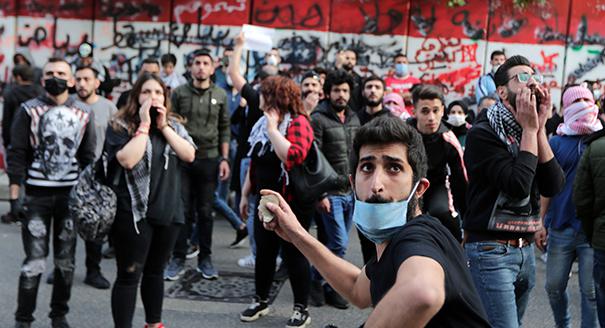In the past six months, the Lebanese have been living through successive shocks. In October 2019, a large number of people took to the streets and public squares to protest against their declining living conditions and call for the overthrow of Lebanon’s highly corrupt and cynical political class. This appeared to be a moment when the country’s vibrant society was voicing its will to live, and live decently. Financial collapse was in sight, indeed had started, but for many protestors it was perceived as a necessary purgatory until something better could replace it.
Then came the coronavirus, which brought Lebanon’s disintegrating economy to a complete standstill. Here was a wake-up call about the fragility of things, so that if the Lebanese were thinking of an economic recovery, it was suddenly apparent that this would be far more complicated than they had anticipated. For a country in deep paralysis, the disease was the embodiment of its continuing agony.
Lebanon’s swing between a desire for rebirth and enforced confinement was reflected in the country’s politics. When people revolted last year they did so against an entire political class that had long monopolized the public realm—a closed club whose members since the end of the war in 1990 had sometimes been in power and sometimes out, while all the time maintaining a collective lock on the country’ political system. But the politicians refused to understand what had really occurred in October. They bided their time in order to reverse it, regain the initiative, and return to their sterile and destructive game.
Lebanon’s financial meltdown and the coronavirus outbreak offered them the perfect opportunities to do so. The main concerns of the state again became a subject of politicized bickering among the same old players: Should Lebanon reimburse part of its debt in Eurobonds or not? Should capital controls on bank accounts, which were informally imposed after the uprising last year, be made legal by an act of parliament? Should Beirut’s airport be completely closed to incoming flights as a shield against the coronavirus, or should it be reopened to admit Lebanese stuck abroad because of the pandemic? Should the governor of Lebanon’s central bank be held responsible for the financial collapse, and what should be done with him?
Amid this cacophony of issues, the Lebanese found themselves powerless once again, returned to the state of apathy and atrophy prevailing before October 2019.
Confinement and social distancing are hardly propitious for pursuing a popular upheaval. And it was highly symbolic that in the midst of a global cataclysm, what were very likely supporters of the country’s politicians destroyed the camp that protestors had set up last October in Beirut’s downtown area, amid general silence. If the Lebanese in revolt do not find inventive ways to revive their dissent in this time of coronavirus, if the protest movement does not provide answers to the questions that are now preoccupying most Lebanese, they could discover upon ending their confinement that their country’s agony has ended with its death.












